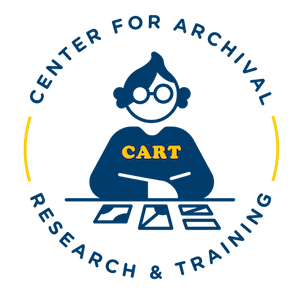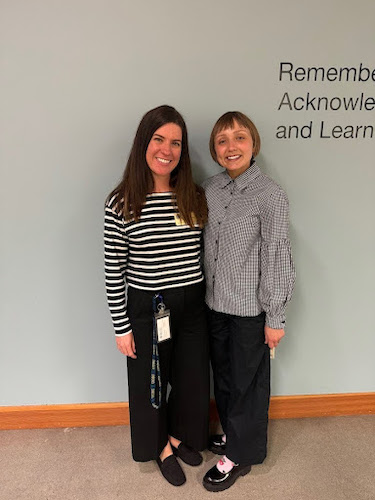Campus News
Center for Archival Research and Training celebrates 10 years of success
This October, the University Library at UC Santa Cruz Elisabeth Remak-Honnef Center for Archival Research and Training (CART) marks its 10th anniversary, celebrating a decade of shaping graduate students’ careers through hands-on archival experience.


This October, the University Library at UC Santa Cruz Elisabeth Remak-Honnef Center for Archival Research and Training (CART) marks its 10th anniversary, celebrating a decade of shaping graduate students’ careers through hands-on archival experience.
Since its founding in 2014, CART has become a cornerstone for students seeking practical skills in archival research, benefiting both their professional growth and the university’s renowned collections. By offering hands-on learning opportunities, CART equips graduate students with the expertise needed for career success while also making valuable library resources more accessible.
“Over its ten years, the CART program has had an impact on student success, in providing a structured learning, research, and career development experience for graduate students,” says Elizabeth Cowell, Richard L. Press University Librarian, Presidential Chair. “CART also benefits our greater community, by making the collections in our care accessible and discoverable for all to use in researching their histories and creating new knowledge.”
To honor this milestone, CART will host a mini-symposium on Oct. 1 featuring alumni of the program who have built successful careers in academia, archives, and beyond. These former fellows will share how CART shaped their professional journeys and opened doors to diverse career paths.
Building Careers Through Archival Work
CART has trained over 40 graduate students, primarily PhD candidates from the humanities, arts, and social sciences divisions. Participants gain direct experience in archival processing, curation, and research, skills that are highly valued in a range of professional fields.
“Working with students from various disciplines has been incredibly rewarding,” says Alix Norton, Archivist for the Center for Archival Research and Training since 2015. “They not only enhance their research skills but also discover new career opportunities, whether in libraries, academia, or beyond.”
Many CART alumni have secured prestigious career positions, including at institutions like the Smithsonian, while others have pursued advanced degrees in library science, solidifying their expertise in the archival field.
Evolving Program Models for the Future
What started as a pilot program, hiring students for 10 hours per week during a single quarter, has evolved significantly. In the 2023-2024 academic year, CART launched a fully funded fellowship, supporting one student for an entire academic year with tuition and fees covered. This model allows for more in-depth involvement, as fellows work closely with archivists and other library staff to process collections and curate exhibits for the public.
The inaugural full-year CART fellow was Meleia Simon-Reynolds, a PhD candidate in history and co-director of the Watsonville is in the Heart (WIITH) Digital Archive. She processed two archival collections, including the records of the Watsonville-Santa Cruz chapter of the Japanese American Citizens League, curated two public exhibits, and planned multiple events to increase engagement with archival materials.
“This fellowship model has been incredibly successful, and we’re excited to continue it this year,” said Norton. “Our 2024-2025 fellow Annika Berry is pursuing her PhD in literature, and will be working on the papers of Donna Haraway. It’s a great opportunity for a student to delve into the work of a renowned scholar who continues to have a huge influence at UC Santa Cruz and globally.”
Showcasing Unique Collections
CART fellows play a key role in processing important archival collections, including the Hayden White papers, Lick Observatory records, and the Yamashita Family papers. The Hayden White collection, which included both physical and digital files, marked CART’s first foray into archiving email correspondence—a groundbreaking experience for students and the Library.
Other collections, such as the early 20th-century photographs and other records from Lick Observatory, offer a glimpse into the development of astronomy at the University of California, while the Yamashita family papers, safeguarded and donated by UC Santa Cruz professor emerita Karen Tei Yamashita, provide a deeply personal view of Japanese American history, spanning generations before, during, and after World War II.
Expanding Reach and New Collaborations
As CART enters its second decade, it is poised to expand its reach even further. One exciting new initiative is part of a broader collaboration between the campus and the Dolores Huerta Foundation. This project, in partnership with UC Santa Cruz’s Latin American and Latino Studies department, the Dolores Huerta Research Center for the Americas, and the Humanities Institute, will include training of two graduate students in archival practice through CART. The students will then travel to Bakersfield during spring break to work alongside a professional archivist on the personal papers of civil rights leader Dolores Huerta, as well as the Foundation’s records. The project represents a growing commitment to social justice and community engagement, and CART’s role in offering students invaluable experience in archival research.
“We’re thrilled to be broadening our impact,” said Norton. “Participating in collaborations like this allows us to offer students even more opportunities for meaningful work, and we’re eager to see where these partnerships take us.”
As CART looks toward the future, its commitment to training the next generation of archivists and scholars remains strong. The upcoming mini-symposium will not only celebrate CART’s past successes but also chart a course for the program’s continued growth.
You can learn more about the Center for Archival Research and Training or make a gift to support the program via the CART website.